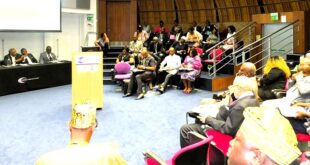WASHINGTON, 25 October 2016 – Sub-Saharan Africa economies carried out a record number of reforms in the past year to improve the business climate for local entrepreneurs, says the World Bank Group’s annual ease of doing business report.
“Doing Business 2017: Equal Opportunity for All,” released today, finds that 37 of the region’s 48 economies adopted 80 reforms in the past year, an increase of 14 percent from the previous year. More than half of the past year’s reforms were implemented by the 17 members of the Organization for the Harmonization of Business Law in Africa (OHADA).
The region’s economies reformed most in the areas of Resolving Insolvency (with 18 reforms) and Starting a Business (15). Nigeria, Rwanda and South Africa, for example, made starting a business easier by introducing or improving online portals. Furthermore, as a part of the OHADA reform agenda, Cameroon, among other things, introduced a new conciliation procedure for companies in financial difficulties. This now makes resolving insolvency easier by allowing additional outlets to settle debts.
Seven economies implemented reforms related to Trading Across Borders. For example, Niger made trading across borders easier by removing the mandatory pre-shipment inspection for imported products. Also, Mauritania made trading across borders easier by upgrading to the ASYCUDA World electronic data interchange system, which reduced the time for preparation and submission of customs declarations for both exports and imports. For example, it now only takes 51 hours in Nouakchott, Mauritania to comply with documentary procedures for exports, compared with 59 hours previously.
As governments continue to take up the reform agenda, Doing Business data shows continued successes on the ground. For example, it now takes an average of 27 days to start a business in Sub-Saharan Africa, compared with 37 days five years ago.
“Although the region still has work to do to make itself more business-friendly, we see steady improvements within various economies in the region,” said Rita Ramalho, Manager of the Doing Business project. “To see a record number of reforms take place in Africa is very encouraging for local entrepreneurs and the global business community alike.”
Mauritius once again ranks best in the region, with an overall Doing Business global ranking of 49. Mauritius performs best in the areas of Protecting Minority Investors and Dealing with Construction Permits, with a rank of 32 and 33 respectively, on those indicators. For example, it takes 156 days to complete the construction permitting processes for simple buildings, compared to 183 days in France and 222 days in Austria.
Ranks of some other economies in the region are Rwanda (56), Botswana (71) and South Africa (74). This year’s report also covers Somalia for the first time, bringing the total number of economies covered globally to 190. Somalia is ranked 190.
For the second consecutive year, Kenya places among the global top 10 improvers. Ranked 92, Kenya implemented reforms in five Doing Business areas. For example, in the area of Resolving Insolvency, the economy introduced a reorganization procedure and introduced regulations for insolvency practitioners. Starting a Business was made easier by removing the stamp duty fees required for the nominal capital, memorandum and articles of association and eliminating requirements to sign the compliance declaration before a commissioner of oaths.
Kenya also streamlined the process of Getting Electricity by introducing a geographic information system which eliminates the need for a site visit, thereby reducing the time and interactions needed to obtain an electricity connection. This reform reduced the time for grid connection by almost two weeks.
This year’s Doing Business report includes, for the first time, a gender dimension in three indicators: Starting a Business, Registering Property and Enforcing Contracts. In Sub-Saharan Africa, 13 economies require additional legal hurdles for women entrepreneurs. For example, six economies (including Cameroon, Benin and Guinea-Bissau) require additional steps for women to formally register a business compared to men.
The Paying Taxes indicator has been expanded to cover post-filing processes, such as tax audits and VAT refund. The report finds that the region has room for improvement in these new areas. In most economies in Sub-Saharan Africa—where it is likely for an audit to take place—taxpayers are exposed to a field audit whereby the auditor visits the taxpayers. This is the case in Botswana, The Gambia, Malawi, Niger, Zambia and Zimbabwe.
What are the ranking trends?
- Mauritius, in 49th place in the Doing Business rankings, is the highest ranked economy in Sub-Saharan Africa. Other economies in the region that perform well on the ease of doing business rankings are Rwanda(at 56),Botswana(71) and South Africa (74).
- The region’s lowest ranked economies are Somalia(190), Eritrea (189), South Sudan (186), and the Central African Republic (185).
- Other large economies in the region and their rankings are Democratic Republic of Congo (184), Ethiopia (159), Kenya(92), Nigeria (169), Tanzania(132), Sudan (168), and Uganda (115).
- Rwanda ranks among the best globally in the Doing Business areas of Getting Credit (with a rank of 2) and Registering Property (4). Rwanda has an efficient land registry and it takes only 12 days to transfer property, compared to 22 days across OECD high income economies.
- Sub-Saharan Africa economies underperform in the areas of Getting Electricity (with an average rank of 151), Trading Across Borders (137), and Dealing with Construction Permits (133). It takes an average of 120 days to obtain a permanent electricity connection to the grid in Sub-Saharan Africa, compared to the global average of 93 days.
What are the reform trends?
- A total of 80 reforms, making it easier to do business, were implemented in 37 of 48 economies in Sub-Saharan Africa in the past year, an increase of 14 percent over the previous year. The 17 members of the Organization for the Harmonization of Business Law in Africa (OHADA)implemented half of these reforms.
- Kenya made the list of global top 10 improvers for the second consecutive year. Among other reforms, Kenya made registering property easier by increasing the transparency at its land registry and cadaster.
- Sub-Saharan Africa accounted for 18 of the 24 reforms globally in Resolving Insolvency. Many economies, like Benin, Burkina Faso and Mali made resolving insolvency easier by introducing a new conciliation procedure for companies in financial difficulties.
- Multiple economies in the region implemented four or more reforms in the past year, including Niger (6 reforms), Kenya (5), Cote d’Ivoire (4), Mauritania (4), Rwanda (4), Senegal (4) and Togo (4).
New inclusions in Doing Business 2017
- This year’s report covers 190 economies, with the inclusion of Somalia.
- For the first time, Doing Business2017includes a gender dimension in three indicators: Starting a Business, Registering Property and Enforcing Contracts. In the Sub-Saharan Africa region, 6 economies make starting a business more difficult for women compared to men. For example, in Cameroon, it takes an extra day for a woman to start a business compared to a man.
- The Paying Taxes indicator has been expanded to cover post-filing processes, such as tax audits and VAT refund. The report finds that the region has room for improvement in these new areas. In most economies in Sub-Saharan Africa—where it is likely for an audit to take place—taxpayers are exposed to a field audit whereby the auditor visits the premise of the taxpayer. This is the case in Botswana, The Gambia, Malawi, Niger, Zambia and Zimbabwe.
- The report includes an annex with a pilot indicator set on public procurement regulations. The ‘selling to the government’ procurement process is studied in 78 economies and is not included in the overall rankings. The indicator set analyzes five main areas: accessibility and transparency, bid security, payment delays, incentives for small and medium-size enterprises and complaint mechanisms.
Rankings Data for Sub-Saharan Africa
The full report and accompanying datasets are available at www.doingbusiness.org
 THE AFRICAN COURIER. Reporting Africa and its Diaspora! The African Courier is an international magazine published in Germany to report on Africa and the Diaspora African experience. The first issue of the bimonthly magazine appeared on the newsstands on 15 February 1998. The African Courier is a communication forum for European-African political, economic and cultural exchanges, and a voice for Africa in Europe.
THE AFRICAN COURIER. Reporting Africa and its Diaspora! The African Courier is an international magazine published in Germany to report on Africa and the Diaspora African experience. The first issue of the bimonthly magazine appeared on the newsstands on 15 February 1998. The African Courier is a communication forum for European-African political, economic and cultural exchanges, and a voice for Africa in Europe.































